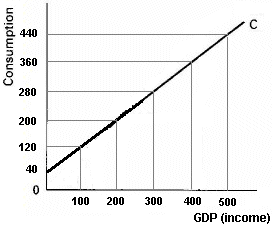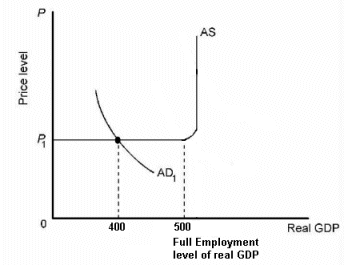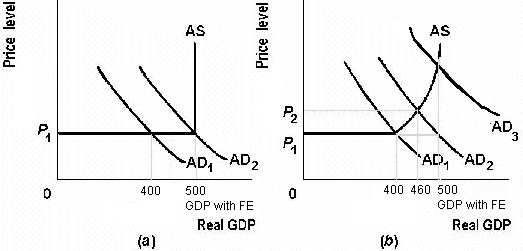Multiplier Problem
Use these graphs to answer the questions that follow
|

|

|
|
|
|
Our overall goal is to learn HOW MUCH the government has to change
spending or taxes to achieve full employment.
- What is the MPC? ____.8______
- What is the MPS?
____.2_________
- What is the simple multiplier?
______5________
- What is the current equilibrium level of output in this
economy? ____400__________
- What level of output can be achieved if this economy had full
employment? ____500_________
- What change in government spending is needed to achieve
full employment?
 GDP =
GDP =  government spending x multiplier
government spending x multiplier
100 = ? x 5
 government spending needed to achieve full employment = + 20
government spending needed to achieve full employment = + 20
- What is the lump-sum tax multiplier?
___4___________
- What change in taxes could the government enact to achieve
full employment?
 GDP =
GDP =  lump sum taxes x lump sum tax multiplier
lump sum taxes x lump sum tax multiplier
100 = ? x 4
 lump sum taxes needed to achieve full employment = -25
lump sum taxes needed to achieve full employment = -25

- In the questions above as real GDP increased there was no
change in the price level as in graph (a) above. But as an economy
approaches the full employment level of GDP usually the price
level will begin to rise as the cost of resources rise as in graph
(b) above. Assuming that there is an increase in the price level
as the economy approaches full employment as in graph (b), What is
the multiplier with changes in the price level?
 GDP =
GDP =  government spending x multiplier
government spending x multiplier
In question #6 above we saw that if government spending increased
by $20 billion, then, assuming that there is noe inflation and MPS
= .2, the AD curve would move from AD1 to AD2 and there would be a
+ $100 billion change in GDP. but if there is inflation, then when
government spending increases by $20 billion and AD increases from
AD1 to AD2, the new equilibrium is only 460, not 500.
Therefore:
 GDP =
GDP =  government spending x multiplier
government spending x multiplier
60 = +20 x ?
and the multiplier with changes in the price level is 3
 GDP =
GDP =  government spending x multiplier
government spending x multiplier
60 = 20 x 3
- Now, with these changes in the price level, what change in
government spending is needed to achieve full employment?
 GDP =
GDP =  government spending x multiplier
government spending x multiplier
100 = ? x 3
Change in government spending needed to achieve full employment if
there is inflation is + $33 1/3 billion.
100 = 33 1/3 x 3


